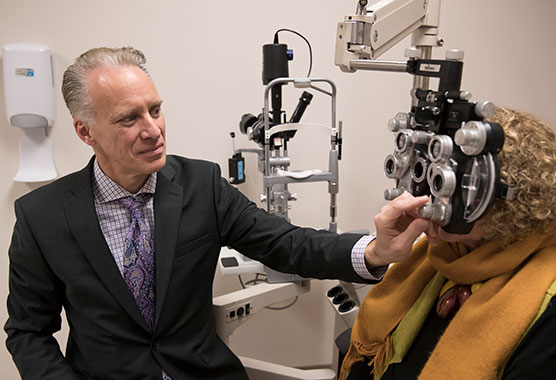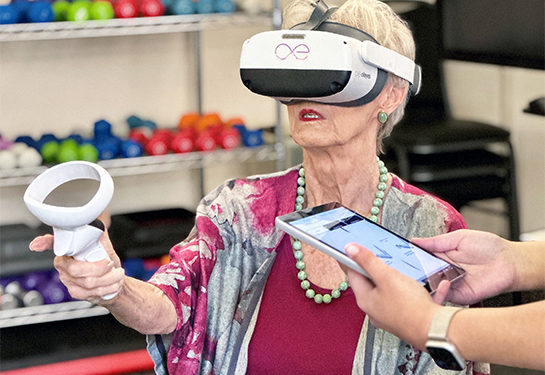Retinal Diseases
Our ophthalmologists provide specialized care for all types of retinal diseases, including rare and complex cases. You receive care from experienced specialists at the forefront of the latest treatments.
Medically reviewed by Kareem Moussa, M.D. on Sep. 08, 2023.

Care for Every Type of Retinal Disease
The UC Davis Eye Center provides expert diagnosis and treatment for every type of retinal disease. Our team provides the latest medical and surgical options that can help preserve your vision or reverse the condition. Learn about our retina services.
What Are Retinal Disorders?
Retinal disorders affect your retina, the thin lining inside your eye that is critical for clear vision. These conditions can range from mild to severe, and without treatment, some can cause blindness.
Retinal diseases can affect the macula (center of the retina) or the peripheral retina (outside edge). The most common retinal conditions include:
- Branch retinal vein occlusion
- Diabetic retinopathy
- Epiretinal membrane (ERM or macular pucker)
- Hypertensive retinopathy
- Macular degeneration
- Macular hole
- Retinal tear or detachment
Symptoms of Retinal Disorders
Retinal disease symptoms can vary widely, depending on what type of condition you have. Not all retinal diseases cause symptoms, especially in their early stages.
Common Symptoms
Possible signs of a retinal disorder include:
- Blind or blank spots in your vision
- Blurry or cloudy vision
- Colors that look less bright or vibrant
- Floaters (seeing floating lines or string-like objects)
- Trouble seeing in low light
Emergency Symptoms
Seek immediate medical care if you notice any sudden changes in your vision, including:
- Dark shadow or curtains in your vision
- Flashes of light
- Large number of new floaters
- Straight lines or objects that look wavy
- Vision loss
Risk Factors for Retinal Diseases
Sometimes retinal diseases happen without an obvious cause. However, certain factors can increase your risk of developing one.
Age
Some retinal diseases, including age-related macular degeneration (AMD), are more common in adults over age 60.
Diabetes
High blood sugar levels from diabetes can damage the blood vessels in your retina, leading to diabetic retinopathy.
Eye Trauma
An impact to your eye can damage your retina, leading to retinal detachment or a retinal tear.
Genetics and Family History
Some retinal conditions can run in families. You may have a higher risk of retinal disease if your parent or sibling has or had one.
Hypertension (High Blood Pressure)
Uncontrolled high blood pressure can lead to retinal diseases like hypertensive retinopathy and retinal vein occlusions.
Smoking
Smoking increases your risk of developing several eye diseases, including retinal disorders. People who smoke are twice as likely to develop AMD.
Diagnosing Retinal Diseases
The UC Davis Eye Center is equipped with the latest technology to diagnose all types of retinal conditions. We use the most advanced eye imaging tests, including optical coherence tomography (OCT), fundus photography, and fluorescein angiography. Read more about ophthalmic imaging referrals at UC Davis Health
Our leading-edge eye imaging tests collect detailed images of your retina. Then, our experienced specialists evaluate your results so you receive an accurate and comprehensive diagnosis.
Retinal Disorder Treatments at UC Davis Health
At UC Davis Health, we participate in clinical research with other leading institutions. As a result, you have access to the most advanced therapies for all types of retinal conditions.
Treatments we provide include:
Photodynamic Therapy
Photodynamic therapy (PDT) is a minimally invasive laser eye surgery that can be used for a number of retinal diseases, including central serous chorioretinopathy and polypoidal choroidal vasculopathy. During this procedure, our specialists seal off abnormal blood vessels in your retina without damaging the surrounding tissue. While PDT is often used to treat exudative age-related macular degeneration, intravitreal injections are now much more common to treat this disease.
Intravitreal Injections
Intravitreal injections deliver medications directly into your eye to treat age-related macular degeneration, diabetic retinopathy, retinal vein occlusion and uveitis. Our team provides anesthesia (numbing) medication and focuses on your comfort throughout the procedure.
Surgery
Our experienced ophthalmology team performs surgery to treat several retinal conditions, including retinal detachment, macular hole and macular pucker. We offer the latest retinal surgery techniques — including pneumatic retinopexy, vitrectomy, and scleral buckle — which can help preserve your vision.
Preventing Retinal Disorders
There is no single way to prevent all retinal disorders. But you can lower your risk of developing one.
First, see your primary care provider regularly to prevent or manage conditions like high blood pressure and diabetes. You should also schedule regular eye exams, which can find retinal conditions in their early stages. Learn about routine eye care and optometry at UC Davis Health
If you work with chemicals or debris, wear proper eye protection. Avoid eye injuries during sports by wearing protective goggles.
"Vision Loss, Blindness, and Smoking," Centers for Disease Control and Prevention (CDC), https://www.cdc.gov/tobacco/campaign/tips/diseases/vision-loss-blindness.html
Who does age-related macular degeneration (AMD) affect?
1 in 10Adults ages 50 and older have early stages of AMD
Number of U.S. adults
8MWho have diabetic retinopathy
Sources: PreventBlindness.org: Age-related Macular Degeneration
American Society of Retina Specialists: Americans in the Dark on Diabetic Retinopathy Symptoms, Risks, Survey Finds
Request an Appointment
As Sacramento's No. 1 hospital, you'll benefit from unique advantages in primary care and specialty care. This includes prevention, diagnosis and treatment options from experts in 150 specialties.
Referring Physicians
To refer a patient, submit an electronic referral form or call.
800-4-UCDAVIS
Patients
Call to make an appointment.
Consumer Resource Center
800-2-UCDAVIS

Ranked among the nation’s best hospitals
A U.S. News & World Report best hospital in cardiology, heart & vascular surgery, diabetes & endocrinology, ENT, geriatrics, neurology & neurosurgery, and pulmonology & lung surgery.

Ranked among the nation’s best children’s hospitals
U.S. News & World Report ranked UC Davis Children’s Hospital among the best in pediatric nephrology, orthopedics*, and pulmonology & lung surgery. (*Together with Shriners Children’s Northern California)

Ranked Sacramento’s #1 hospital
Ranked Sacramento’s #1 hospital by U.S. News, and high-performing in aortic valve surgery, back surgery (spinal fusion), COPD, colon cancer surgery, diabetes, gynecological cancer surgery, heart arrhythmia, heart failure, kidney failure, leukemia, lymphoma & myeloma, lung cancer surgery, pacemaker implantation, pneumonia, prostate cancer surgery, stroke, TAVR, cancer, orthopedics, gastroenterology & GI surgery, and urology.

The nation’s highest nursing honor
UC Davis Medical Center has received Magnet® recognition, the nation’s highest honor for nursing excellence.

World-class cancer care
One of ~59 U.S. cancer centers designated “comprehensive” by the National Cancer Institute.

A leader in health care equality
For the 13th consecutive year, UC Davis Medical Center has been recognized as an LGBTQ+ Healthcare Equality Leader by the educational arm of America’s largest civil rights organization.

